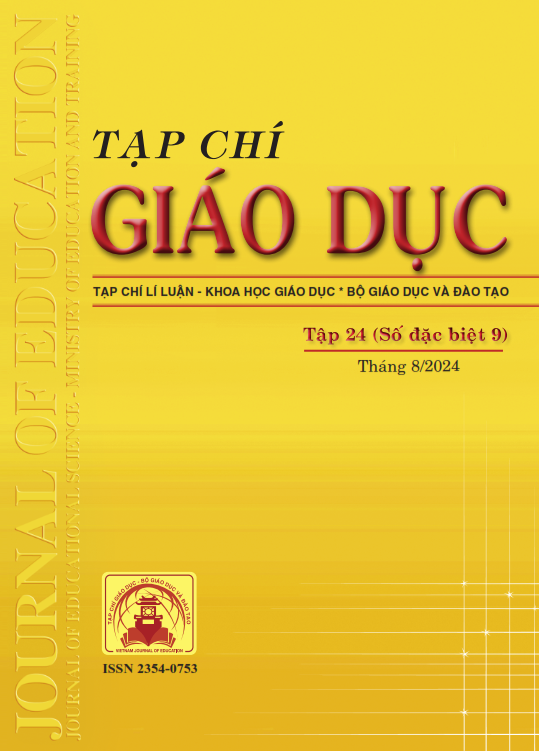Quy trình phát triển năng lực xây dựng môi trường vui chơi theo mô hình “Học tập trải nghiệm” của David A. Kolb cho sinh viên ngành Giáo dục mầm non
Tóm tắt
In the current context, developing and forming learners' competence is one of the important goals and tasks to successfully carry out the cause of industrialization and modernization of the country. And the Pedagogical School. it is necessary to organize the training process so that preschool students have solid skills and increasingly meet the reality of preschool education innovation. The article presents some theoretical issues of David A. Kolb's experiential learning model, developing the competence to build a playing environment in preschool for pedagogical university students majoring in preschool education following the model of David A. Kolb. The research results are expected to help students apply this practice and experience model into the training process to develop professional competence for students in the early childhood education sector.
Tài liệu tham khảo
Beard, C. (2010). The experiential learning toolkit: Blending practice with concepts. London: Kogan Page Publishers.
Bộ GD-ĐT (2009). Chương trình giáo dục mầm non (ban hành kèm theo Thông tư số 17/2009/TT-BGDĐT ngày 25/7/2009).
Bộ GD-ĐT (2020). Thông tư số 51/2020/TT-BGDĐT ngày 31/12/2020 về sửa đổi, bổ sung một số nội dung của Chương trình Giáo dục mầm non ban hành kèm theo Thông tư số 17/2009/TT-BGDĐT ngày 25/7/2009 của Bộ trưởng Bộ GD-ĐT, đã được sửa đổi, bổ sung bởi Thông tư số 28/2016/TT-BGDĐT ngày 30/12/2016 của Bộ trưởng Bộ GD-ĐT.
Đào Thị Ngọc Minh, Nguyễn Thị Hằng (2018). Học tập trải nghiệm - lí thuyết và vận dụng vào thiết kế, tổ chức hoạt động trải nghiệm trong môn học ở trường phổ thông. Tạp chí Giáo dục, 433, 36-40.
Doan, T. N., & Bui, V. H. (2021). The application of David A. Kolb’s experiential learning model to teach the science subject in primary schools for students’ competency development. International Journal of Development Research, 11(2), 44537-44541. https://doi.org/10.37118/ijdr.21110.02.2021
Hoàng Thị Phương (chủ biên), Lã Thị Bắc Lý, Bùi Thị Lâm, Nguyễn Mạnh Tuấn, Nguyễn Thị Mỹ Dung, Vũ Thanh Vân (2021). Tổ chức hoạt động giáo dục theo hướng trải nghiệm cho trẻ ở trường mầm non. NXB Đại học Sư phạm.
Barnett, L. A., & Kleiber, D. A. (1984). Playfulness and the early play environment. The Journal of Genetic Psychology, 144(2), 153-164. https://doi.org/10.1080/00221325.1984.9923421
Kolb, A., & Kolb, D. (2018). Eight important things to know about the experiential learning cycle. Australian Educational Leader, 40(3), 8.
Kolb, D. A. (1984). Experiential Learning: Experience as the source of Learning and Development. Englewood Cliffs, New Jersey, Prentice Hall.
Shelley, A. (2020). Reverse Bloom: A new hybrid approach to experiential learning for a new world. Journal of Education, Innovation and Communication, 2(2), 30-45. https://doi.org/10.34097/jeicom-2-2-dec2020-2
Đã Xuất bản
Cách trích dẫn
Số
Chuyên mục
Giấy phép

Tác phẩm này được cấp phép theo Ghi nhận tác giả của Creative Commons Giấy phép quốc tế 4.0 .












